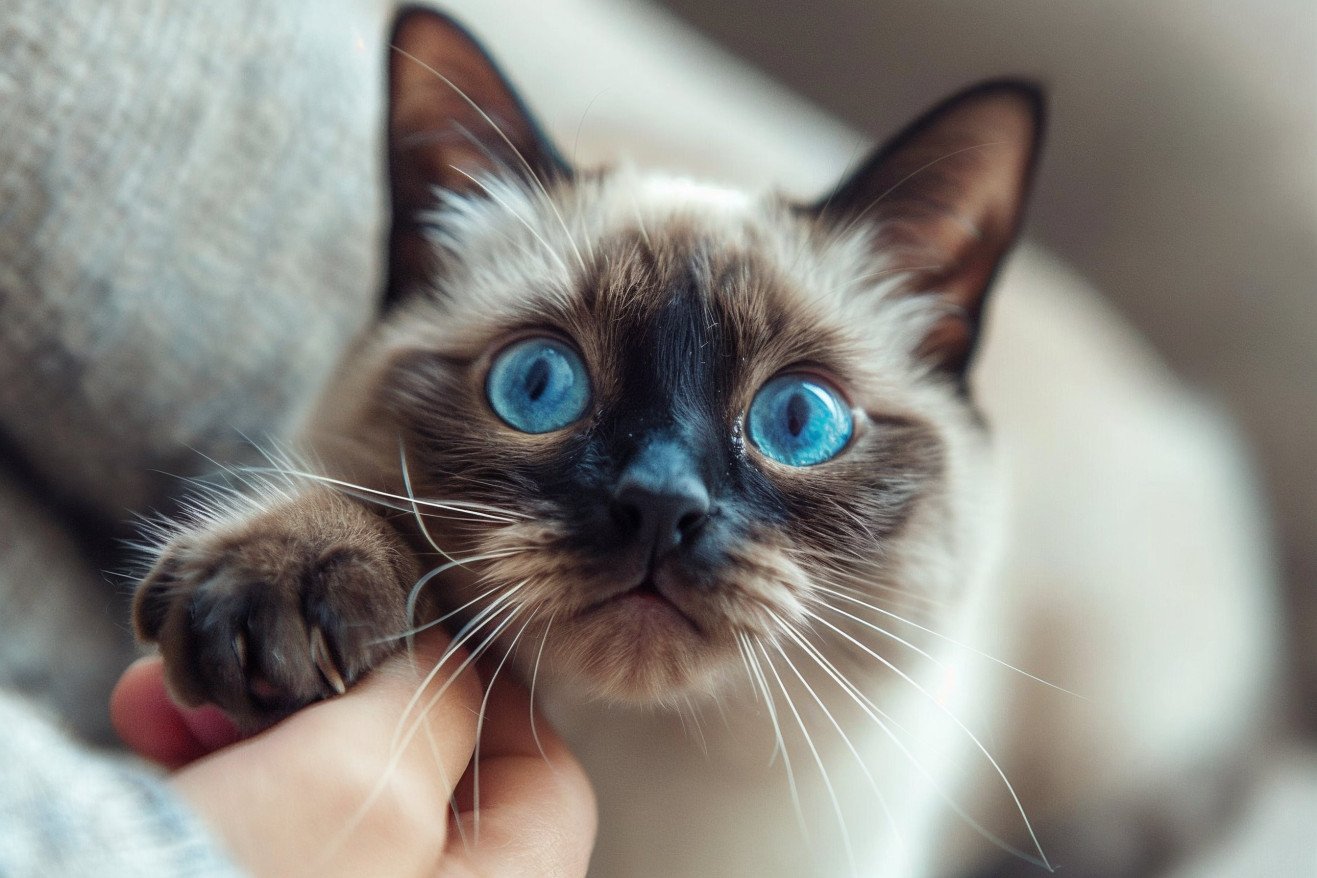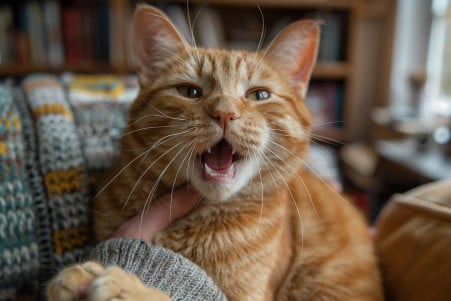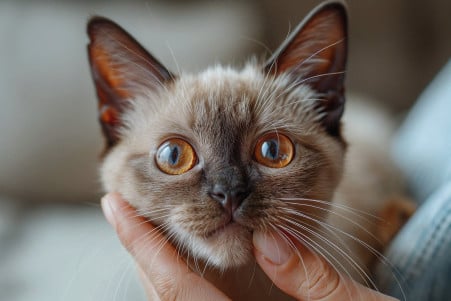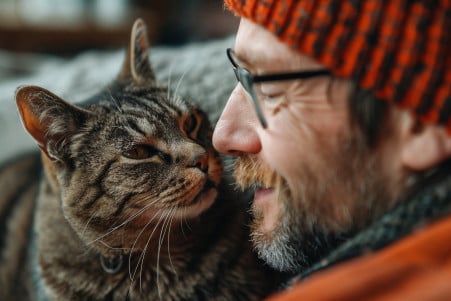Why Does My Cat Hug My Arm and Then Bite? Understanding Feline Behavior
30 March 2024 • Updated 29 March 2024

If you’ve ever had a cat wrap its paws around your arm and then bite you, you know how confusing it can be to receive a gesture of affection followed by an act of aggression. However, this behavior is a result of a cat’s natural instincts and play behavior, even when it’s aimed at their favorite human.
In this article, we’ll look at the research of animal behaviorists and other experts who have investigated the biological and psychological reasons for this behavior. We’ll also look at cat communication, predatory play, and the impact of early experiences to help you better understand why your cat does what they do. By the end, you’ll have a better understanding of your cat and how you can use that knowledge to build an even stronger relationship with them.
Why does my cat hug my arm and then bite me?
Predatory Instincts and Cat Biting
While your cat may seem like a sweet, loving pet, it's important to remember that they are natural hunters, and their predatory instincts can sometimes come out in behaviors that seem contradictory, like biting and cuddling. Cats are hardwired to stalk, pounce, and catch prey, and these instincts can sometimes spill over into their interactions with their human family members.
As Cats.com explains, “love biting” often starts with playful pouncing and mock hunting on a person’s hands or feet. The biting is preceded by the hugging action, which is meant to hold the “prey” still. While this behavior can be shocking and even painful, it’s not aggressive. Instead, it’s a sign of a cat’s natural predatory instincts, according to Dr. Elizabeth Colleran, as cited by Care.com.
Just like kittens playfully wrestling with their littermates, adult cats may engage in this behavior as a form of rough play, acting out the behaviors they would use to catch and hold down their prey. As The Conversation points out, kneading and biting are both rooted in the instinctual behaviors kittens exhibit when nursing from their mother.
Recognizing that this behavior is rooted in a cat’s natural instincts can help pet parents understand that it’s not a sign of aggression. This, in turn, can help them respond more patiently and compassionately, which can help them build a stronger relationship with their feline friend.
Cat Bites as Communication: What Your Cat Is Trying to Tell You
Cat bites are a way for cats to communicate, and they can express a variety of feelings and needs. According to Cats.com, these "love bites" can mean that your cat is showing affection, feeling overstimulated by petting, wanting attention, or even just feeling playful. Meanwhile, as Dr. Elizabeth Colleran notes, understanding what a cat is trying to say when they bite involves paying close attention to their body language and other behaviors.
For example, cats may give light love bites when they are happy and bonded, but a deeper bite may mean that they are getting overstimulated by petting. If pet owners can recognize the signs of stress, such as a cat's tail starting to twitch or their pupils dilating, they can often head off a biting incident. As a result, pet owners can use the information they've gleaned from these feline communication signals to deepen their bond with their cat and respond accordingly, according to Care.com.
This information about the communicative nature of cat biting, along with the information about predatory instincts, helps paint a fuller picture of this complex cat behavior. Armed with this information, pet owners can work to strengthen their relationship with their cats.
Play and Kitten Development and Cat Biting Habits
The biting and kneading that cats do to their owners is often a result of the cat's kittenhood. According to HSHV, kittens learn to knead, bite, and wrestle with their littermates and mother through play, which is important for developing their hunting and survival skills. This play behavior can continue into adulthood, with cats engaging in play hunting and pouncing, often on their human family members.
As Comfort Zone points out, kneading and biting are often a sign of contentment and a way for cats to soothe themselves, similar to the nursing they did as kittens. The Vets also say that this play behavior can help cats mark their territory and feel more secure in their home.
Knowing that play and kitten development play a role in a cat's biting habits can help owners learn to predict and manage this behavior. Stella & Chewy's recommends redirecting a cat's natural predatory instincts with appropriate toys and regular play sessions, which can also help strengthen the bond between cats and their owners.
How to Deal With Cat Biting: Tips and Tricks
One way to deal with biting is to make sure your cat has plenty of toys and other outlets for their energy. This way, they can redirect their biting to something more appropriate. Purina UK recommends that cat parents create an enriching environment that includes scratching posts, cat trees, and hiding places to encourage natural behaviors like kneading and pouncing.
You can also use positive reinforcement to help manage biting. Catster explains that you can use treats or praise to reward your cat when they exhibit the behavior you want, such as gentle petting. This way, they'll learn to associate positive things with the behavior and be less likely to bite.
According to Daily Paws, it's important to be patient and consistent when dealing with biting. You should never punish your cat for biting because it can make them more anxious and make the behavior worse. Instead, a kind, patient approach that takes your cat's needs into account can help you build a stronger relationship with your cat and help them stop biting.
When to Get Professional Help for Excessive Cat Biting
While some biting and suckling is normal, especially in kittens, if your cat is biting you excessively or aggressively, it may be a sign of a deeper issue that needs to be addressed by a professional. According to WebMD, excessive biting can be caused by medical issues like pain, stress, or anxiety. If the behavior suddenly starts, it may be a way for your cat to cope with pain or other issues, according to PetMD.
If your cat's biting is an ongoing issue, or if it's particularly severe, you should talk to a vet or animal behaviorist. These professionals can help you determine if there are any medical issues at play and help you find ways to deal with the behavior. According to Cole and Marmalade, warning signs that you should seek help include biting that draws blood or biting that's directed at specific people, which may be a sign of a more serious problem.
Getting help can help ensure that your cat is healthy and happy and can also help you build a stronger relationship with your pet. By getting to the bottom of the issue, you can find ways to deal with your cat's biting and improve your relationship with your pet.
Conclusion: How to Strengthen Your Relationship With Your Cat
This article has taken a deep dive into the complex reasons behind the behavior of cats hugging and then biting their owners. By examining a cat's predatory behaviors, communication styles, and stages of life, we've learned a lot about why this behavior is so common.
Knowing that biting is often a result of a cat's natural hunting instincts, as well as their ways of showing affection and overstimulation, can help pet parents better understand and deal with the behavior. Providing the right toys, using positive reinforcement, and making sure that a cat's environment is stimulating are all important ways to help manage and redirect the behavior.
While some biting is normal, if it's happening frequently or aggressively, it may be time to consult a vet or animal behaviorist. Getting professional help can make sure that both the cat and the pet parent are safe and happy and can even help strengthen the bond between the two.
In the end, accepting a cat for who they are and learning to communicate with them in their own language can help you build a more meaningful relationship. By learning about and accepting a cat's behaviors, pet parents can make the most of their relationship with their feline companions.


